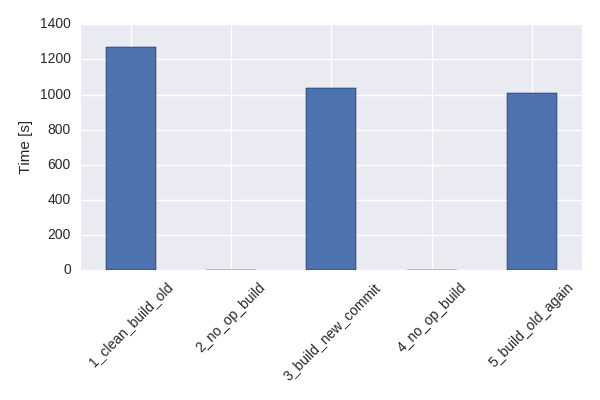Benchmarking the Bazel build system on real-life C++
tldr;: Bazel does a good job on local builds. Check out my second article for the juicy bits on remote caching.
Bazel is the open-source version of Google's internal build system that is used to build their billions of lines of code. Google's PR machine has been effective so far, and it seems that the project is picking up steam. But how fast is it for real-life projects? I ran my own benchmarks to find out.
Picking a project to benchmark
Large C++ projects have a tendency to build very slowly, due to unfortunate language "features" and tooling that has never really outgrown design constraints from the 70s.
I scoured GitHub for one such project with a Bazel build already set-up, and came across drake, a robotics toolbox by MIT CSAIL. The migration from CMake to Bazel is actually underway as I'm writing this, and you can follow its progress on this GitHub issue.
cloc reports a fair amount of C++ code, even without considering all the
third party dependencies that are downloaded from external repos (some of
which are quite substantial, like the Bullet physics library).
| Language | files | blank | comment | code |
|---|---|---|---|---|
| C++ | 817 | 21778 | 18847 | 110883 |
| C/C++ Header | 544 | 12379 | 34730 | 42462 |
| MATLAB | 333 | 2327 | 3313 | 10292 |
| CMake | 104 | 1360 | 1819 | 7301 |
| Python | 70 | 993 | 1365 | 3387 |
Build time benchmarks
I've prepared a Docker image and some Python scripts to time how long Bazel takes to build the drake tree. While drake actually ships with a CMake build too, any direct comparison would be biased since the set of targets between the two differ quite a lot. The code is available on my GitHub.
The benchmarks.py script is designed to simulate real-life development
workflows, and will run through the following steps:
- checkout the code
- do a fresh build of the drake project
- build again, without modifying any file (no-op build)
- checkout a different commit
- do an incremental build of this new commit
- revert to the original commit
- build again
To approximate day-to-day changes to the codebase, I've picked two commits
roughly two weeks apart. git diff says that ~30k lines differ between the
two. Elapsed times for each of these steps look like this:

While the first build takes around 20 minutes, re-building after upgrading to the newer commit only takes ~ 50% of that, confirming that dependency tracking is doing something (but it's really hard to find out how much of this is to Bazel's credit).
One thing I'm really excited about is that no-op builds (i.e. when no file is modified) are really fast: under 2 seconds for tens of thousands of C++ files. Such great performance can likely attributed to the Bazel daemon running in the background and maintaining a cache to speed up dependency checks.
Conclusions
Bazel seems to handle local builds just fine, and provides a good out-of-the box experience where a single command downloads third party dependencies and builds the project. However, this is something that many other build systems, including CMake, can provide already. In this area, Bazel doesn't really serve a compelling story, except for the arguably cleaner configuration format.
However, Bazel also supports remote caching and execution, where build artifacts can be shared between multiple workstations to speed up builds, and even built on a pool of workers instead. These neat features were born out of Google's massive scale, and are enabled by Bazel's very strict approach to build dependencies. Have a look at my [second article](on my blog) for more information and benchmarks about them.